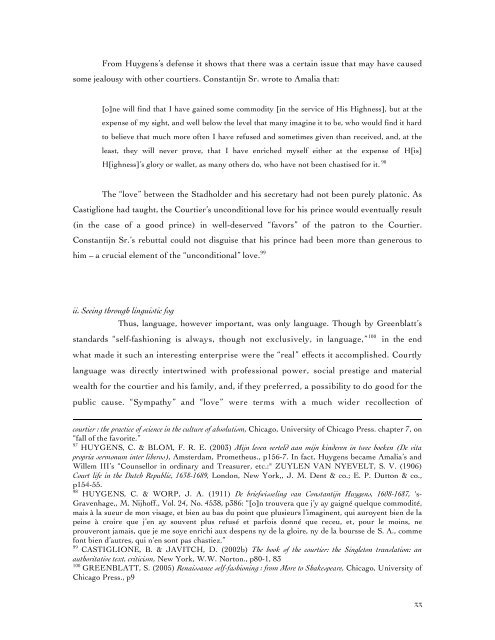Christiaan Huygens – A family affair - Proeven van Vroeger
Christiaan Huygens – A family affair - Proeven van Vroeger
Christiaan Huygens – A family affair - Proeven van Vroeger
Create successful ePaper yourself
Turn your PDF publications into a flip-book with our unique Google optimized e-Paper software.
From <strong>Huygens</strong>’s defense it shows that there was a certain issue that may have caused<br />
some jealousy with other courtiers. Constantijn Sr. wrote to Amalia that:<br />
[o]ne will find that I have gained some commodity [in the service of His Highness], but at the<br />
expense of my sight, and well below the level that many imagine it to be, who would find it hard<br />
to believe that much more often I have refused and sometimes given than received, and, at the<br />
least, they will never prove, that I have enriched myself either at the expense of H[is]<br />
H[ighness]’s glory or wallet, as many others do, who have not been chastised for it. 98<br />
The “love” between the Stadholder and his secretary had not been purely platonic. As<br />
Castiglione had taught, the Courtier’s unconditional love for his prince would eventually result<br />
(in the case of a good prince) in well-deserved “favors” of the patron to the Courtier.<br />
Constantijn Sr.’s rebuttal could not disguise that his prince had been more than generous to<br />
him <strong>–</strong> a crucial element of the “unconditional” love. 99<br />
ii. Seeing through linguistic fog<br />
Thus, language, however important, was only language. Though by Greenblatt’s<br />
standards “self-fashioning is always, though not exclusively, in language,” 100 in the end<br />
what made it such an interesting enterprise were the “real” effects it accomplished. Courtly<br />
language was directly intertwined with professional power, social prestige and material<br />
wealth for the courtier and his <strong>family</strong>, and, if they preferred, a possibility to do good for the<br />
public cause. “Sympathy” and “love” were terms with a much wider recollection of<br />
courtier : the practice of science in the culture of absolutism, Chicago, University of Chicago Press. chapter 7, on<br />
“fall of the favorite.”<br />
97 HUYGENS, C. & BLOM, F. R. E. (2003) Mijn leven verteld aan mijn kinderen in twee boeken (De vita<br />
propria sermonum inter liberos), Amsterdam, Prometheus., p156-7. In fact, <strong>Huygens</strong> became Amalia’s and<br />
Willem III’s “Counsellor in ordinary and Treasurer, etc.:" ZUYLEN VAN NYEVELT, S. V. (1906)<br />
Court life in the Dutch Republic, 1638-1689, London, New York,, J. M. Dent & co.; E. P. Dutton & co.,<br />
p154-55.<br />
98 HUYGENS, C. & WORP, J. A. (1911) De briefwisseling <strong>van</strong> Constantijn <strong>Huygens</strong>, 1608-1687, 's-<br />
Gravenhage,, M. Nijhoff., Vol. 24, No. 4538, p386: “[o]n trouvera que j’y ay gaigné quelque commodité,<br />
mais à la sueur de mon visage, et bien au bas du point que plusieurs l’imaginent, qui auroyent bien de la<br />
peine à croire que j’en ay souvent plus refusé et parfois donné que receu, et, pour le moins, ne<br />
prouveront jamais, que je me soye enrichi aux despens ny de la gloire, ny de la boursse de S. A., comme<br />
font bien d’autres, qui n’en sont pas chastiez.”<br />
99 CASTIGLIONE, B. & JAVITCH, D. (2002b) The book of the courtier: the Singleton translation: an<br />
authoritative text, criticism, New York, W.W. Norton., p80-1, 83<br />
100 GREENBLATT, S. (2005) Renaissance self-fashioning : from More to Shakespeare, Chicago, University of<br />
Chicago Press., p9<br />
33


